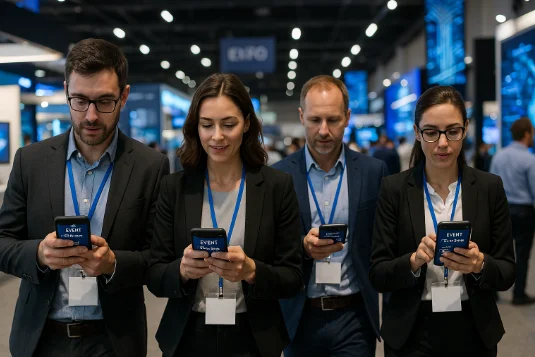2025-04-30 00:00:00


As corporate events evolve in 2025, technology is no longer just an add-on it’s a central driver of engagement, efficiency, and memorability. Whether hosting a DMC in Madrid, a DMC in Barcelona, or a DMC in Valencia, technology in corporate events is reshaping how companies connect with employees, partners, and stakeholders.
From immersive virtual reality experiences to advanced LED walls and real-time event apps, tech innovations are enabling event planners to create high-impact experiences that align with strategic goals. Across Spain, event planners use technology to create seamless, high-impact experiences aligned with strategic business goals.
In 2025, event attendees expect more than static presentations. They seek interaction, personalization, and inspiration. As a result, the role of technology in event management has expanded to meet those demands both in physical and virtual formats.
More and more companies are increasing their investment in event technology, prioritizing tools that enhance data collection, engagement, and visual impact, according to recent industry observations. Whether through biometric check-ins, AI-powered networking, or holographic speakers, technology enables a more dynamic, inclusive, and measurable event experience.
The role of technology in event management extends far beyond audiovisual enhancements. It plays a vital part in improving planning efficiency, attendee engagement, and overall event outcomes. From streamlining check-in processes to enabling real-time feedback, technology equips planners with tools to deliver events that are both seamless and impactful.
In highly competitive markets like Spain, where international standards and guest expectations are high, understanding and applying the right tech solutions is essential for success.
Custom apps give attendees access to agendas, maps, speaker bios, and real-time updates all from their smartphones. They also support live polling, surveys, and feedback tools, turning passive audiences into active participants.
Custom-branded event apps are commonly used in retreats and conferences across Barcelona to help attendees navigate sessions, participate in polls, and receive real-time updates.
Large-scale LED walls create stunning visuals for keynotes and brand storytelling. Paired with creative stage design, they transform ordinary spaces into immersive environments—without heavy construction.
In cities like Madrid, immersive LED walls and motion graphics are widely used in executive events to reinforce brand identity and maintain attendee engagement.
Projection mapping allows planners to animate surfaces walls, ceilings, even buildings with branded or thematic content. It’s particularly effective in gala dinners, product launches, or evening entertainment segments.
Historic venues in Seville offer stunning backdrops for 3D projection mapping, often used during gala dinners or brand celebrations to create immersive storytelling experiences.
With international teams becoming more distributed, VR and hybrid tech keep remote attendees equally engaged. From 360° virtual venue tours to VR product demonstrations, this technology ensures accessibility without compromising experience quality.
Hybrid event formats are increasingly popular across Spain, combining on-site immersion with virtual reality tools that allow remote attendees to explore environments or content in real time.
Lighting influences energy and perception. With smart lighting systems, you can adjust ambiance throughout an event from warm tones for networking to cool hues for focus. These tools also sync with music and stage effects for a cinematic feel.
Smart lighting systems are increasingly used to adjust the ambiance of corporate events throughout their phases from networking sessions to keynote moments.
Spain offers more than beautiful settings it offers the support of a DMC agency in Spain for corporate events. Here are some destination-specific applications of technology in corporate events:
Barcelona: Tech-forward product launches using AR and interactive touchscreens in modern venues like CCIB
Madrid: Government forums supported by multilingual AI captioning and LED panels for live data visualization
Valencia: Sustainability summits with digital carbon footprint tracking apps and smart waste systems
Seville: Corporate dinners in historic spaces enhanced by projection mapping and silent audio experiences
Each location blends tradition with tech, creating memorable environments ideal for brand storytelling and employee connection.
In 2025, embracing event technology is not a luxury it’s a strategic imperative. Technology empowers planners to engage audiences, measure impact, and deliver unforgettable experiences across formats.
At CREA Group events, we believe technology should serve your event’s purpose not distract from it. With nearly two decades of experience as a trusted DMC agency in Spain for corporate events, we integrate technology in ways that:
Enhance participant engagement
Improve operational efficiency
Elevate visual and emotional impact
Support real-time data capture and analysis
Interactive LED screens, event apps, and 3D mapping are among the most effective tools for creating immersive and engaging experiences. When combined with thoughtful storytelling and creative design, these technologies can elevate the emotional and strategic impact of an event.
It increases participant interaction, gathers analytics (polls, feedback, dwell time), and reduces operational friction. By integrating tools like personalized apps or live data tracking, companies gain measurable insights to improve future events.
Absolutely. Tech tools like mobile agendas, digital feedback, and ambient lighting enhance even intimate formats. At CREA Group events, we apply scalable solutions that match the size and goal of each program.
